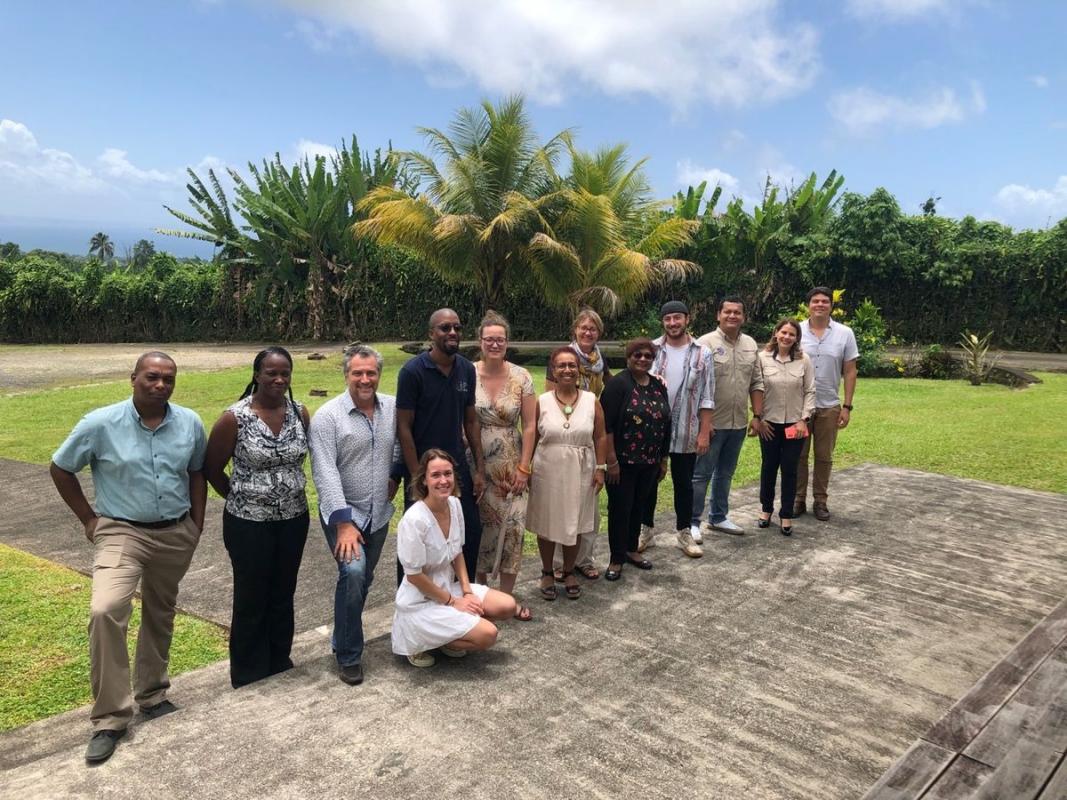- Home
- Worldwide
- CIRAD worldwide
- Projects
- AUSCAR Project
One Health Approach to Reduce Health Risks in the Caribbean - AUSCAR

First Meeting to Present the "One Health" Community of Practice © Cirad
Challenges
The recent Covid-19 pandemic has highlighted the need for a comprehensive, collaborative, and integrated approach to managing health at different levels: national, regional, and international. It has underscored the interdependence between human and veterinary public health and environmental health, as conceptualized in One Health approaches. The interconnectedness of these various health aspects, typically managed at the national level by different ministries, requires agile coordination methods among various stakeholders. Additionally, the complex management of health risks due to the involvement of multiple actors and the complexity of factors to consider (social, ecological, economic, organizational) necessitates a precise translation into public policy and governance to facilitate the implementation of health risk prevention actions and the strengthening of socio-ecosystem resilience.
The AUSCAR project will cooperatively develop and transfer technical solutions to health stakeholders to reduce and manage health risks related to major agricultural productions in the Caribbean and Central America. To achieve this, adapted, effective, and easily deployable tools and methods will be developed within countries for disease prevention, surveillance, early warning systems, and ecological disease control (both animal and plant).
Description
The project's main activities are structured into different work packages, including:
- Establishing a 'One Health' community of practice at the Caribbean level through regional workshops and the co-construction of postures, tools, and collaborative methods using the ImpresS method.
- Proposing methods to evaluate surveillance systems in countries and territories in the region and supporting their implementation. While establishing efficient and sustainable alert and response systems for health risks by optimizing alert and surveillance methods through innovative approaches (molecular detection, risk modeling).
- Establishing resilient socio-agrosystems (resilient to health risks and climate change) with solutions based on agroecological practices and practice optimizations.
- Supporting the implementation of integrated health policies and governance to address health risks.
Expected Results
The AUSCAR project aims to improve agricultural production, food security, and economic opportunities in 36 countries or territories in the Caribbean and Latin America. This will increase income generation and improve livelihoods, especially for small-scale farmers.
The project's deliverables will include organizational, technical, policy, communication, and training aspects. In the initial phase, three organizational deliverables will be produced: the creation of a community of practice and two technical partner networks. Numerous technical deliverables will be developed, including four surveillance and health surveillance evaluation methods, an inventory of diseases, and two tools for disease detection and risk assessment.
Additionally, 300 new varieties will be created and evaluated in Guadeloupe and the region, with 48 being transferred to the Caribbean. Two variety selection methods and two diversified plots (agroforestry and crop associations) will be implemented. Knowledge and skills related to integrated antimicrobial resistance surveillance will be developed, and proposals for harmonized surveillance protocols for African swine fever in the region will be co-constructed and proposed to regional countries.
Eight national assessments of health policy will be conducted, and coordination mechanisms between national policies and initiatives promoting regional health governance in the Caribbean and its neighboring states will be analyzed.
Written and visual project promotion materials will be produced, and technical documents and scientific publications in the fields of animal and plant health will be prepared. In terms of capacity-building for partners, 24 training and awareness seminars will be organized for around a hundred health professionals and farmers on surveillance and agroecological management of health risks.
CaribVET (Network for animal health and veterinary public health), Centro Agronomico Tropical de Investigacion y Ensenanza (CATIE, Costa Rica), Caribbean Plant Health Directory Forum (CPHD), Corporacion Bananera Nacional (CORBANA, Costa Rica), Instituto de Investigaciones en Fruticultura Tropical (IIFT, Cuba), Instituto de Investigaciones sobre Viandas Tropicales (INIVIT, Cuba), Organismo Internacional Regional de Sanidad Agropecuaria (AGROSAVIA, Colombia), Organismo Internacional Regional de Sanidad Agropecuaria (OIRSA), and six research units of Cirad (AGAP, ASTRE, GECO, Innovation, PHIM, QualiSud).
























